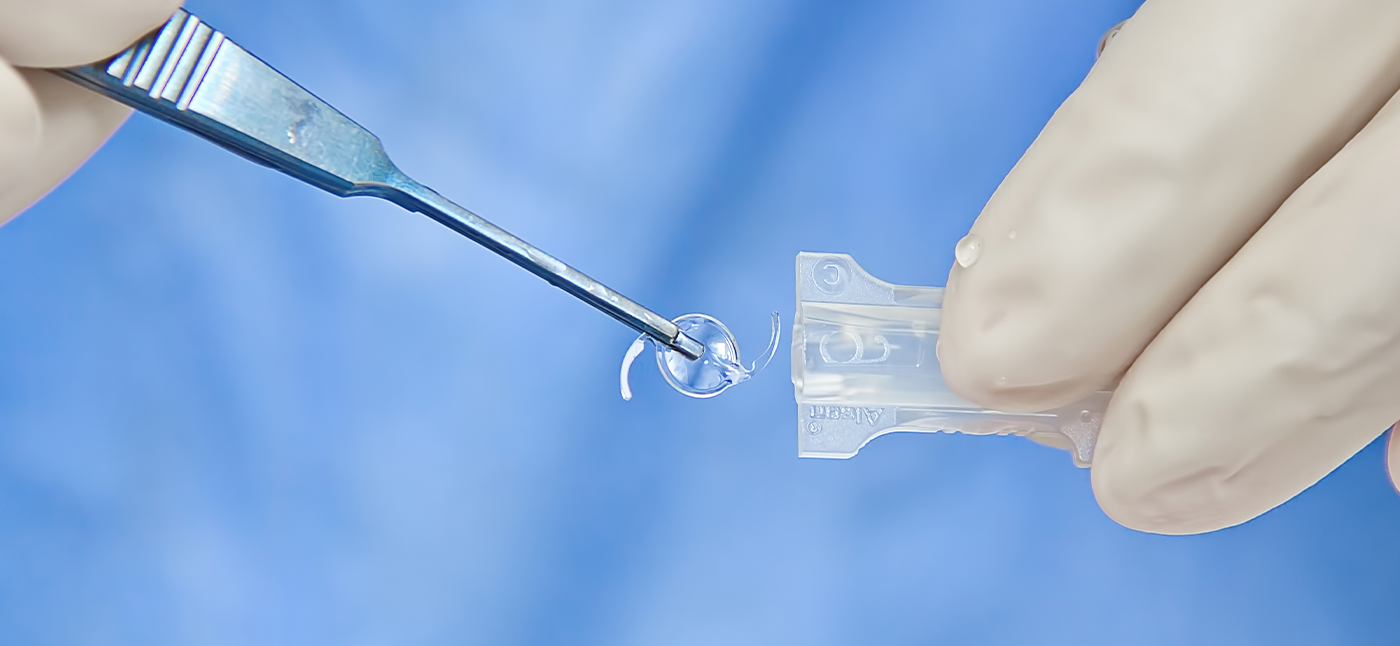Intraocular Lenses (IOLs) for Cataract Surgery
Mar 18, 2024
INSIGHTS,HEALTHIOLs are artificial lenses that replace the natural lens removed during cataract surgery. They come in different types, each offering unique benefits.

Cataract surgery is a common procedure. It replaces the eye's clouded natural lens with a clear artificial lens called an intraocular lens (IOL). This guide will delve into the world of IOLs. It explains the different types available and how they can improve your vision beyond simply reversing cataracts. We'll explore factors to consider when choosing an IOL. It will help you make an informed decision. This can assist you alongside your doctor to achieve the best possible outcome for your vision and lifestyle.
Cataracts and the Need for Surgery
Cataracts develop when the natural lens of the eye becomes cloudy. As a result, this leads to blurred vision, sensitivity to light, and difficulty seeing at night. Factors such as age, genetics, and lifestyle can increase the risk of developing cataracts. When cataracts start to interfere with daily activities, surgery may be advisable.
What are Intraocular Lenses (IOLs)?
IOLs are artificial lenses that replace the natural lens removed during cataract surgery. They come in different types, each offering unique benefits. The most common types of IOLs include monofocal, multifocal, and accommodating lenses. Your ophthalmologist will help you choose the most suitable IOL based on your lifestyle and visual needs.
Types of IOLS: Short Comparison
| Feature | Monofocal IOL | Multifocal IOL | Accommodating IOL |
| Distance Vision | Excellent | Good | Good |
| Near Vision | Glasses needed | Good | May need glasses |
| Intermediate Vision | Glasses needed | May be good | May be good |
| Focus Distances | One (far) | Multiple | Multiple (possible) |
| Glasses Dependence | High | Low | Moderate |
| Design | Simple | Complex | New |
| Cost | Lower | Higher | May be higher |
| Benefit | Sharpest distance vision | Reduced glasses use | Wider vision range (possible) |
| Drawback | Needs glasses for other ranges | Halos, glare possible | New technology, unknown long-term effects |
Cataract Surgery with IOL Implantation Process
Cataract surgery is a safe and effective way to improve vision clouded by cataracts. During the surgery, a surgeon replaces the cloudy lens with an artificial one called an intraocular lens (IOL). Here's a guide to help you prepare for successful surgery and optimal vision correction:
Before Surgery:
- Consultation and Exams: Talk to your eye surgeon about your vision goals, medical history, and medications. You'll also have eye exams to measure your eyes and assess their health.
- Pre-Surgery Instructions: Your doctor may ask you to stop certain medications and make dietary changes. Arrange transportation to and from the surgery center.
On the Day of Surgery:
- Fasting: You'll be asked to avoid eating or drinking (except water with medications) for several hours before surgery.
- Arrival: Arrive on time at the surgery center and follow instructions about clothing and belongings.
After Surgery:
- Aftercare: Your doctor will give you instructions on using prescribed eye drops and avoiding strenuous activities.
- Follow-up Appointments: Attend scheduled appointments to monitor your progress and ensure proper healing.

Complications and Risks of IOLs
Intraocular lenses (IOLs) are generally safe and effective for improving vision after cataract surgery. However, like any surgery, there are potential risks to be aware of:
General Risks:
- Infection: Rare but serious; can happen after any surgery.
- Bleeding: Minor bleeding possible during surgery; excessive bleeding rarely affects vision.
- Inflammation: Common after surgery but usually goes away with medication.
Specific Risks for IOLs:
- Posterior Capsular Opacification (PCO): The capsule behind the IOL may become cloudy, affecting vision. Treatable with a laser procedure.
- IOL Malposition: Rare, but the IOL can move out of place, affecting vision and possibly requiring corrective surgery.
- Glare and Halos: Some people may see glare or halos, especially with multifocal IOLs. These may improve over time or require glasses.
- Retinal Detachment: Rare but serious; can occur after any eye surgery, including cataract surgery.
Long-Term Outlook: What to Expect After Surgery
Cataract surgery with IOL implantation can be a life-changing procedure. Here's what you can expect in the long term:
Vision Improvement:
- Many people see a significant improvement in their vision and need glasses or contacts less often.
- The level of improvement depends on the type of IOL and your specific situation.
- Vision usually stays stable for many years after surgery.
Follow-up Care:
- Regular eye exams are important to monitor your eye health and vision.
- Your doctor will look for issues like PCO and treat them if necessary.
- How often you need check-ups will depend on your situation.
Life After Surgery:
- Most people can return to normal activities soon after surgery, but there may be restrictions during recovery.
- You can do things like reading, driving, and being outdoors with better vision.
- Some activities, like swimming or contact sports, may require protective eyewear to protect your eyes.
Cost of Cataract Surgery with IOL Implantation
Cataract surgery with IOL implantation costs can vary based on:
- Location: Prices differ between countries, with developed nations usually more expensive.
- Type of IOL: Basic IOLs cost less than advanced options.
- Surgeon's fees: Experienced surgeons may charge more.
- Facility fees: Costs for the surgical center or hospital can add to the total.
- Insurance: Your plan may cover part of the cost.
The cost of intraocular lenses (IOLs) for cataract surgery typically ranges from €3,000 to €6,000 per eye. However, the prices potentially might be higher for premium IOLs. These countries, including India, Mexico, Thailand, and Costa Rica, may offer lower cataract surgery costs.
Discover the perfect clinic for your cataract surgery with IOL implantation on our platform, Wupdoc! Dive into detailed profiles of top doctors and clinics specializing in cataract surgery and eye care.
Our user-friendly interface lets you filter your searches by location, clinic ratings, and services offered. Plus, read real patient reviews to gain insight into the quality of care provided by each clinic. Make an informed choice for your vision and eye health with Wupdoc!
top 5 doctors & clinics in Intraocular Lenses:
 5.0Turkey, Antalya
5.0Turkey, AntalyaEye Care
Dr. Dorukcan Akıncıoğlu, a specialist in Smart Lens, NoTouch Laser, Lazy Eye, and a range of other eye conditions, offers expert care and innovative treatments. With a background in Gülhane Military Medical Academy, Dr. Akıncıoğlu has extensive experience in Orbital Tumors, Thyroid (Graves) Orbitopathy, Ectropion Correction, and more. His expertise also includes Entropion Correction, Eyelid Tumors, Eye Tumors, and Revision Eyelid Surgery. Dr. Akıncıoğlu is skilled in Orbital Decompression, Orbital Fractures, and treating Tear Duct Blockage. He specializes in addressing Congenital Face - Head Anomalies, providing Droopy Eyelid Treatment, and managing Facial paralysis. Additionally, Dr. Akıncıoğlu performs surgeries such as Movable Eye Prosthesis, Socket Reconstruction, Eyelid Reconstruction, Epithesis Surgery, and Orbital Reconstruction. Trust your eye care to Dr. Akıncıoğlu for personalized treatments and compassionate care.
# 1
 5.0Albania, Tirana
5.0Albania, TiranaEye Care
Art Eye Clinic offers top-quality care for your vision, providing advanced treatments for a range of eye conditions. Specializing in cataract operations, intraocular lens placement, glaucoma treatment, and pterygium operations, we help patients maintain their eye health with the latest medical techniques. Whether you're looking to restore your vision or manage eye diseases, our experienced team ensures effective and personalized care. Visit Art Eye Clinic for comprehensive solutions and expert treatment, ensuring your eyes remain healthy and your vision stays clear.
# 3
 4.8Turkey, Antalya
4.8Turkey, AntalyaEye Care
Established in 1991 in Antalya, the Orbit Medical Centre offers top-notch medical services to the city and the Mediterranean region. The Centre's emphasis on collective efforts and professional interdependence has earned it a reputation as the premier ophthalmological care provider in the region. With its advanced infrastructure, the Centre's ophthalmologists share their knowledge and experience, with particular focus on excimer laser, cataract, glaucoma, keratoconus, and diabetic treatments. The Centre upholds ethical and deontological principles, and prioritizes patient treatment over commercial interests, resulting in patients' trust and establishing the Centre as a model organization.
# 4
 5.0Spain, Barcelona
5.0Spain, BarcelonaEye Care
The Castanera Institute of Ophthalmology founded in 1954, is a leader in ophthalmology, blending tradition with pioneering use of advanced technologies and techniques. Our commitment to scientific research ensures the highest quality of care. Specializing in a range of eye treatments, we offer solutions for cataracts, LASIK, intraocular lenses, retina conditions, glaucoma, and presbyopia. With decades of experience and a dedication to innovation, the Castanera Institute provides exceptional eye care to help you achieve optimal vision. Trust our expert team for your eye health needs and experience the best in modern ophthalmology. Visit the Castanera Institute for cutting-edge treatments and personalized care.
# 5
Get a Free Quote
Let Us Help You Find the Best Doctors for Your Needs
Fill out the form, and an assistant will contact you shortly to discuss your needs and guide you to top specialists.

Table of Contents
read this next:
Mar 18, 2024
TECHNOLOGY,HEALTHIntraocular Lenses (IOL): Which One is Right For Me?
Intraocular lenses (IOLs) are tiny, artificial lenses implanted inside the eye. They act as a replacement for your eye's natural lens, which focuses light rays allowing you to see clearly.
Looking for the Right Treatment?
Let us find the best doctors & clinics you need. Get your free quote today!
Get a Free Quote



